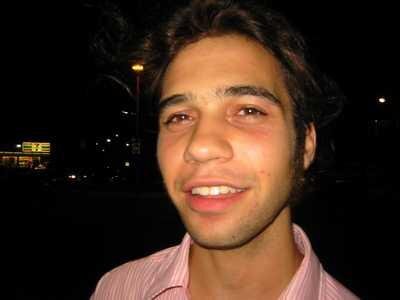Joshua Glenn, Globe Staff
IDEAS FIRST HEARD about local wunderkind Gabriel Boyer in 2001, when the 24-year-old Brookline High alum gave a series of lectures at Roxbury’s Berwick Research Institute art venue on romantic love, utopian thought, and causal reasoning, punctuated by his noodling on a Wurlitzer electric piano. Boyer, who works odd hours at the Coolidge Corner theater and a Newton after-school program, went on to found Bedroom Theater, a weekly happening in the bedroom of his Jamaica Plain loft. After taking his show on a bedroom-to-bedroom tour across America last summer, he dropped out of sight. But now he has reappeared, brandishing copies of “How to Tell the Living from the Dead” (Mutable Press), a self-published first novel in which a father belatedly attempts to convey to his estranged son what makes him tick. Ideas telephoned Boyer at home in Jamaica Plain.
IDEAS: What does the title of your novel mean?
BOYER: It’s a phrase that occurred to me a while back and made me laugh, because it seems so obvious how to tell the living from the dead! But the title also suggests a theme with which I’m obsessed – the complex process of giving up. Most novels are concerned with the drama of living, with the heroic struggle against the life-situation into which each of us is thrown. But I wanted to explore what life looks like to a person who has ceased struggling against it. It seems to me that inertia and depression can also be an avenue to self- understanding.
IDEAS: The father character, Reginald, is a Boston man whose life – from the 1950s through the `90s – is depicted in discrete, disjointed scenes.
BOYER: I originally wrote a straightforward narrative, but then decided that plot and character aren’t so important. Instead, I wanted to explore Reginald’s experience of giving up on life, and – even though Reginald is a pathetic figure – to make the book amusing to read. So when I got back from the Bedroom Theater tour I started deconstructing the narrative. I love movie trailers, the way they make you feel that you’ve seen the entire film but leave you wanting to know more. I wanted each section of the book to be like a trailer – fragmentary and mysterious.
IDEAS: Your novel is set on the Allston-Brookline border. You seem to find that part of town quite depressing.
BOYER: That’s where I grew up. For me, Boston and Brookline and Cambridge are, collectively, like a favorite armchair – one so comfortable that you actually lose the will to accomplish anything. People often compare New York to a prison that you can’t escape, but I think that the Boston area poses a more insidious problem. As Reginald discovers, those of us who grow up here may be free to leave at any time, but for some reason we find that impossible to do.

